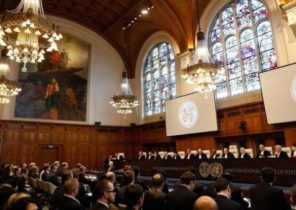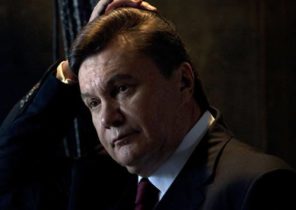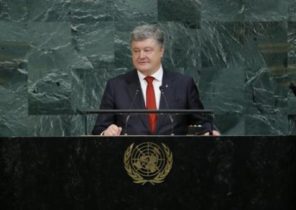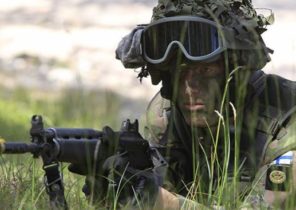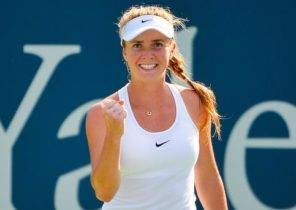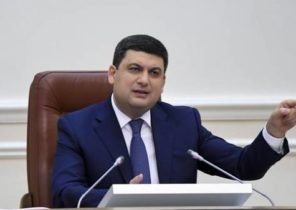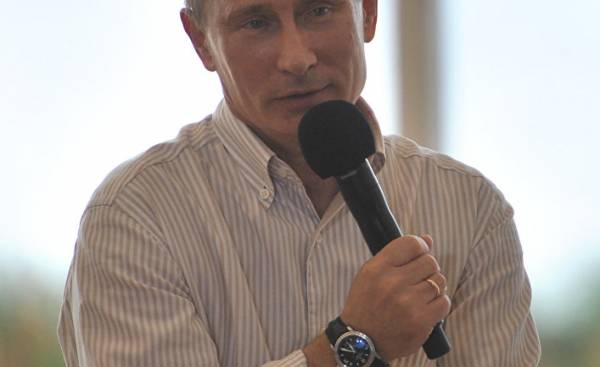
Everything the leaders in the millennial history of Russia was faced with the same problem: cumbersome this country is inherently unstable, regardless of what system it manages. And despite the bravado of his administration, President Vladimir Putin is no exception. The problems faced by today, approaching the end of the 17th year of his reign, eerily similar to the problems the occurrence of which anticipated the collapse of the Soviet Union and the Russian Empire before it. But Putin is skillfully able to draw lessons from history. Based on the failures of his predecessors, he may be able to postpone the sunset of his administration or even to prevent it.
Once the Savior of Russia
Putin came to power in Russia as a Savior in times of chaos — in the past the leaders of this country did not just take on this role. Tsar Michael I, the founder of the Romanov dynasty and Vladimir Lenin came to power as a result of civil unrest — the time of Troubles in the XVII century and the Russian revolution of 1917 respectively — and restored order in the country. Putin also demonstrated his skills in a period of rapid 1990-ies, when under the administration of President Boris Yeltsin, the first post-Soviet leader, the country was plunged into economic crisis. At that time a group of rich businessmen got control of most of the companies in the country, in many regions of the country formed the separatist movement, the army and security services was in decline, and in Chechnya, was brewing a new war. Meanwhile, the government of Russia reigned utter disorder – it was a cacophony of conflicting points of view.
For the world and for most Russians, Putin has been a mystery, since his career was centered in St. Petersburg, and not in the capital. However, his strong leadership in the positions of head of the security service, the Prime Minister, and then President of the country soon helped him win the hearts of Russians. Putin calmed the discontented regions, has sent the Russian army in Chechnya, began to return strategically important assets under the control of the state and to prosecute disloyal politicians, while simultaneously promising the Russians a steady income. The new leader has promised to restore Russia to its place in the international arena, which should be hers by right. He also wanted to improve relations between Russia and the West.
But, whatever his vision for the future of the country, the problems in the management of Russia remained the same. Like many rulers before him, Putin led a vast country inhabited by many different peoples, suffering from a weak economy surrounded by hostile powers. Like his predecessors, Putin gradually began to lean towards a more authoritarian style of government, to ensure the stability of the country. The Kremlin got rid of the independent media, opposition political parties and foreign non-governmental organizations. Today in Russia, dissent is prosecuted is almost the same as terrorism, and any protests are quickly dispersed. Putin’s tactics, although it is not so cruel, is built in accordance with this line of reasoning, which is very similar to the way of thinking of the Soviet General Secretary Joseph Stalin: Russia — the country is too fragile, that she could manage without the use of force. Putin put Russia against the West, triggering a confrontation in the spirit of the cold war. A leader who in the past has said that Russia could eventually join NATO, now calls this Alliance with Russia’s enemy number one.
Strengthening the system in turbulent times
Many years later, during which Putin showed himself as a strong authoritarian ruler, he now faced a number of internal problems that begin to experience the architecture of system strength. Russia’s economy is experiencing a period of protracted stagnation and although the government is still able to somehow cope with the difficulties ordinary citizens is not the case. Now the Russians on average spend half their income on buying food. A quarter of Russians faced wage cuts or late payment, and 20 million citizens of Russia is 14% of the population — now live below the poverty line. The level of poverty in Russia today is growing faster than ever since the 1990-ies. In addition, the Kremlin is facing a rapid change in the structure of Russia’s population. More than 25% of Russian citizens were born after the collapse of the Soviet Union, that is a huge number of Russians do not remember the chaos which preceded the arrival of Putin to power. Moreover, the rise of social networks has led to the fact that Moscow is now much harder to control the flow of news. The political system is gradually falling into decay as soon as the leaders of a country are aging. Meanwhile, there is growing tension between the shrinking Orthodox population and the growing Muslim community.
Internal problems are further complicated foreign policy situation. Unable to salvage the government of Viktor Yanukovych in the period of the Euromaidan protests in Ukraine in 2014, Russia lost an ally and jeopardized its national security. Then, the United States and the European Union have imposed sanctions against Moscow, which is still in effect, and NATO began to increase its military potential at Russian borders. Moreover, the Kremlin’s attempts to interfere in elections in foreign States through cyber attacks, propaganda campaigns and disinformation — turned against him. Now Russia is faced with a United front of Western countries opposed it.
But despite all these changes and despite the mass protests taking place across Russia and an increase in the resistance from the regional leaders, the Kremlin continues to cling to the system that was built almost 20 years ago. Most likely, Putin will try to re-election in March 2018, and the government has banned the opposition leaders to take part in these elections. To further strengthen his regime, the President is trying to destroy dissent in all its forms, and he has launched new security services throughout the country.
Putin increasingly clings to a system in which the cracks become wider. Being under the same pressure, Tsar Nicholas II and Soviet General Secretary Leonid Brezhnev reacted similarly, that is stubborn and refused to reform the atrophied political and ideological structures that surrounded them. The similarities of these situations are astounding, and there is no doubt that Putin also clearly sees them.
Echoes of the past
When Nicholas II, and Brezhnev came to power in the country in 1894 and 1964, respectively, they inherited an already established and seemingly stable political system. They both became successors of the rulers, wavering between autocracy and reform. By the time when they came to power, the government of the Russian Empire and the Soviet Union already faced such serious problems that neither solution helped.
In those days Russian society was on the move, as people increasingly moved to cities and became more mobile. During the reign of Nicholas II, for example, the population of Russia increased by 31%, and the population of large cities has doubled. Under Brezhnev in the Soviet Union there was a very similar process: in 1982, when he died, 64% of Russians lived in cities. In addition to the increase in urban population Nicholas II, and Brezhnev faced with a much more educated — and rebellious — to the public. In the 1870s and 1880s, years after the abolition of serfdom in 1861, Russia has gradually formed an educated lower class. But during the Brezhnev era, the number of Soviet citizens with higher education has increased threefold and by the beginning of 1980-ies to 1 million people.
The country’s economy could not cope with the growing number of educated people seeking work. The sudden decline in Europe, where the Russian government and the nobility invested a lot of money, has led to a sharp reduction of the Russian economy in 1899. The Soviet economy also declined in the period of Brezhnev — this period was called the era of stagnation. The average annual growth declined from 5.2% in 1960 to only 1.8% in 1980 — a significant slowdown compared with the rapid growth of living standards which were characteristic of the 1950-ies. To 1970-m to years, the shortage of commodities and food was for the Soviet Union the norm, and the citizens of the country are accustomed to long queues and coupons. In addition to the internal problems and Brezhnev, and Nicholas II had somehow to cope with crises in the international arena. The Russian Empire was embroiled in the First world war after less than ten years after its defeat in the Russo-Japanese war, and in this conflict she lost more than 9 million people. The huge losses sustained by Russia in the war, intensified the discontent of the educated radicals and workers who are tired of autocracy. Half a century later, Brezhnev faced with increasing potential of NATO, with the mediated war in Vietnam (and later with the war in Afghanistan) and the popular uprisings in Eastern bloc countries. Many Soviet leaders who understood that the system is undue pressure, they feared that discontent inside and along the border could escalate into large-scale uprising.
To reform or not to reform?
Given the pressures on the Russian and Soviet systems, advisers of the king and of the Secretary-General urged them to implement reforms to protect their government from collapse. After the revolution of 1905 Nicholas II reluctantly ceded, agreeing to give the Russian people more freedom in choosing their representatives. The result is a legislature in which one-third of the seats occupied to the radicals and liberals. The Prime Minister (and interior Minister) Pyotr Stolypin realized what was coming, and advised the king to reform the political system to eventually create an independent working class, which, however, will be faithful to the king. The reforms proposed by Stolypin could have prevented the 1917 revolution and to put Russia on the path, which was more prosperous Western countries. But the king did not want to do the reforms, instead focusing on the war and the growth of revolutionary sentiment in Russia.
Brezhnev also rejected the proposal to reform the Soviet system in the mid 1960-ies. Prime Minister Alexei Kosygin proposed a number of measures aimed at the decentralization of the Soviet economy and to make the working class more productive and tech-savvy by raising wages and bonuses. However, the plan met resistance from the Soviet bureaucracy (and this is not surprising because the reforms were suggested including reducing the number of administration officials responsible for the economy), and it was realized only partially. Brezhnev even more centralized economy and cemented the emphasis of the Soviet system on the production volume, which increased pressure on the workers, who at the time was beginning to resent the actions of the government. British journalist and writer Martin Walker (Martin Walker) wrote that Russia has experienced “a social revolution while Brezhnev slept.” Meanwhile, the Soviet leadership was rapidly weakened: in the three years after the death of Leonid Brezhnev at their posts died two more General Secretary, Yuri Andropov and Konstantin Chernenko. The last leader of the Soviet Union Mikhail Gorbachev saw the signs of impending destabilization and tried to carry out economic, social and political reforms to avoid collapse. But by that time it was too late.
Putin’s Choice
Now, when the Russian government is becoming more authoritarian, Putin must answer to the familiar question of whether to adapt his regime to the requirements of a changing country. The main advocate of the reforms is Alexei Kudrin, a former Finance Minister and now an informal adviser to Putin. Kudrin left the Kremlin in 2011, in a period of fierce dispute around how you want to manage the resources of Russia. Now he is proposing to gradually decentralize the possession of the strategically significant Russian companies, including “Rosneft” and “Gazprom” to ensure the flow of capital and technology. Given the experience of Gorbachev, he understands that the system is unable to cope with the large number of changes in too short a period of time — and he also understands that time is short. Kudrin has repeatedly warned that if the Kremlin will not conduct economic and political reforms now, in the coming years, its stability will be threatened.
Although Putin is a devoted student of their national history, he did not listen to the warnings of Kudrin. Instead, like Nicholas II, he continued to strengthen the system, which he built. The Russian President decided to add to this mixture an additional element of uncertainty: in the absence of potential successors, the whole system is completely up to him, at least not yet.
Putin’s unwillingness to reform, perhaps due to his understanding of the differences between the Russian Federation, the Soviet Union and the Russian Empire. Modern Russia, for example, is not interested to regain the border of the giant Russian Empire or the Soviet Union, and instead she’s trying to get leverage over neighboring States. The Kremlin knows well enough its limited resources and the fact that he will not be able to manage so many lands and peoples. Moreover, in spite of all their statements, he admits that external powers are trying to destroy the Russian Federation. Russia occupies the 12th place in the list of the largest economies in the world, it is one of the main suppliers of energy resources and has one of the most powerful nuclear arsenals on the planet. Its collapse will destroy the global system. Moreover, instability in Russia may provoke new conflicts across the region, including Chechnya, the Caucasus and Central Asia.
In addition to the excellent knowledge of history, Putin has demonstrated the ability to evolve with Russia. Instead of talking to a complete reorganization of his government, he is likely to make a choice in favor of certain reforms, which he would punctuate with repressive measures to keep the instability under control. Consolidating the Kremlin, strengthening the army and enlisting the support of voters, he scored high enough defense that his system could survive for long enough — perhaps even after his departure. However, like all Russian leaders before him, he realizes that nothing can exist forever.
